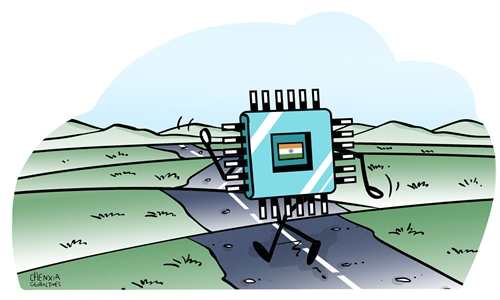
India Illustration: Liu Rui/GT
Since the Modi government launched the "Make in India" program, it has been common to see India issue protectionist policies to curb imports and promote local manufacturing. Yet, these moves, which reflect India's failure to address problems underlying its manufacturing woes, will only lead to weakening investor confidence in India's business environment.
India has just imposed import licensing requirements for laptops, tablets and personal computers, according to a government notice published on Thursday.
While the government gave no reason in the notice, Rajeev Chandrasekhar, India's information technology minister, on Friday said on social platforms that the government aims to ensure "trusted" hardware and systems, to reduce dependence on imports and to increase the domestic manufacturing of these products.
The new rule caught the industry by surprise. Apparently, the Indian government is pressuring foreign electronics manufacturers to shift their production to India so that more laptops, tablets and personal computers can be produced locally. This may be because India's laptop and tablet markets are dominated by foreign brands, with domestic brands mostly underperforming.
If anything, the development is another blatant exposure of India's protectionism. But the irony is that a government desperate for foreign investment is constantly raising "red flags" for foreign companies. Whether they are Chinese companies like Xiaomi, or other foreign ones like Shell, Nokia, IBM, Walmart and others, India can always find an excuse to launch investigations and impose heavy penalties on those foreign companies.
Some people in India think that if foreign companies only want to make money from Indians but don't want to invest in India, then certain policies need to be used to force them to make local investment, because they cannot give up such a populous market as India.
This may explain why the Indian government has rolled out policies to promote domestic manufacturing over the years, including but not limited to raising import tariffs and imposing import restrictions on various products.
But the performance of India's manufacturing development hasn't fared as expected. India's manufacturing sector's value-added as a share of GDP fell from about 16 percent in fiscal 2015-16 to below 13.32 percent in fiscal 2022-23, according to media reports.
This reality may prove that India fails to recognize the real reasons that are slowing its manufacturing development, and that escalating curbs in the wrong direction will cause a stagnation of market-oriented reforms, detrimental to the promotion of the manufacturing industry.
Indeed, India's measures and policies toward foreign companies have already damaged its international reputation and ability to attract foreign investment as a potential manufacturing hub, with potential investment benefits gradually offset by the risks and costs of its unpredictable regulatory environment that likes to catch investors with unwanted surprises.
Fundamentally speaking, India's manufacturing development should be built based on radical reforms in its market system, which needs to improve toward openness and lower market barriers for foreign investors, instead of the opposite.
Yet, the Indian government appears to be more comfortable than ever in promoting manufacturing through imposing pressure, which means its protectionism may be still on the rise. With more trouble that could be expected in the Indian market, it is naive of some in the West to pin their hope of replacing China's supply chains in India.



